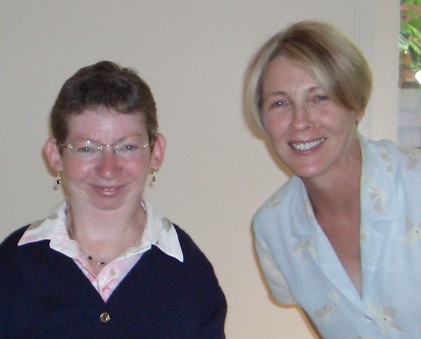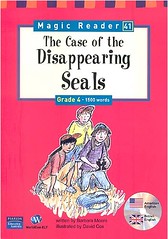This is cross-posted with permission from the original guest author. It was first posted as a Friday Hoyden feature at Hoyden About Town on September 4, 2009.]

This obituary has been provided by Marion May Campbell, who supervised Barbara Moore’s thesis,
The Art of Being a Tortoise: Life in the Slow Lane. The thesis is being edited for submission for a Master of Arts by Research in Creative Writing at the School of Culture & Communication, University of Melbourne. Many thanks to Marion for sharing Barbara’s life with us. Three excerpts from Barbara’s memoir have been included at the foot of the post, with the permission of her family and supervisor.
Image: Barbara Moore and her sister, Anne. [with permission]
Early Life
Born to an Irish-Australian family in the northern Melbourne suburb of Reservoir, Barbara Moore contracted in early infancy a virulent form of infantile rheumatoid arthritis, which went undiagnosed until she was nine. At this stage she was immobilised for ten weeks in a plaster cast, which effectively stole from her much of her remaining mobility. Despite shocking chronic pain, Barbara completed high school and began studies in law at RMIT in the early 1970s, performing well enough there to gain entry to study Law at the University of Melbourne. She persisted with her application, responding with a fiercely defiant stare to the interviewing professor’s question as to whether she thought she had a right to deprive a fine young man of a place. She loved those student years, especially revelling in the companionship and conviviality she found as a resident at St Mary’s College.
After Graduation
After graduation, having gained solid to good honours grades in many subjects, Barbara worked in the Auditor General’s office and later in the Freedom of Information office. While she could still manage limited walking, she drove a car to her city-based work and began to pay off her own town house, her courage and persistence having brought down barriers like her bank manager’s reluctance to offer a loan to a single disabled woman.
In the early 1990s, as her mobility became further reduced through the chronic rheumatoid arthritis, Barbara decided to retire from the Law to devote herself to writing. She enrolled in a Graduate Diploma in Professional Writing at RMIT, where she received an award for her outstanding work. One of her stories about her friendship with an old German priest was made into a superb short documentary film by a graduate filmmaking student. Barbara completed her graduate diploma amassing lots of distinctions for work produced across the genres.
 Barbara began writing educational children’s books. Four of these were published by Pearsons, and translated into many languages. She told me, her eyes sparkling with mirth, that her children’s books sold well in Korea and that she was ‘hot in Siberia’.
Barbara began writing educational children’s books. Four of these were published by Pearsons, and translated into many languages. She told me, her eyes sparkling with mirth, that her children’s books sold well in Korea and that she was ‘hot in Siberia’.
During this time her condition had worsened to the degree that she had to give up independent living and move into a select retirement home, in which she had her own apartment and wheelchair access to a beautiful neighbouring park. She also was an inveterate poet, ranging from witty, light and nonsense verse to metaphysical conceits of considerable accomplishment. She loved the haiku form, and held workshops for fellow residents.
Master of Arts
It was from here that she enquired about the possibility of doing a Master of Arts by Research in Creative Writing with us at the University of Melbourne in the then Department of English. Initially Barbara didn’t proceed at first, because she was no longer able to type for herself. When the Disability Services Unit offered accommodations in the form of technical and carer’s support, she was delighted to embark on the Master’s the following year. After two years of study, Barbara was awarded the Fay Marle Scholarship, which helped her enormously and gave her a great boost of encouragement.
I agreed to drive out to Balwyn for Barbara’s supervisory sessions once a month, when Barbara’s health made this possible. I was shocked and moved to meet this diminutive woman whose body was severely affected by chronic rheumatoid arthritis. Visible joints were fiercely red, swollen, and twisted. Despite pain always 8/10 and often at 9/10, she was never was able to take painkillers, due to her severe allergies. Yet, here she was, in her cropped auburn hair, brightly dressed in funky earrings and striped stockings, brimming with intelligence and wit, ready to get the maximum out of our 2-3 hour sessions, which always began with a cappuccino and cake for Barbara.
Her project for her Masters thesis, entitled ‘The Art of Being a Tortoise: Life in the Slow Lane’, is an episodic, acutely vivid, at times heart-breaking, but often hilarious disability memoir. Although Barbara did not think the memoir was as polished as she might have liked, I know that what I read was pretty much ready to go, and I believe that Barbara has written at least another 10,000 words since then. The pace was frustratingly slow for both of us, and held up by Barbara’s frequent hospital stays due to accident and infection; however, I thoroughly enjoyed working with her, because of the sheer courage, tenacity and wickedly irreverent sense of humour she always exhibited. It would be hard to find a more fiercely funny feminist socialist than this incredibly spirited woman.
Fighting to Finish the Thesis
A week before Barbara passed away, when she mouthed to me that she was in fact dying, I promised her that I would do this in consultation with her sister Anne Duggan, herself a graduate of Melbourne. Barbara nodded her consent and thanks. It also meant a lot to her niece, Frances Overton, an undergraduate in the School of Education, who has worked devotedly at Barbara’s side every weekend, typing to Barbara’s dictation.
It was only in May that Barbara went into rapid deterioration necessitating what we thought would be respite care for a while, to try to deal with her nausea, reactive depression and acute discomfort. Tragically, it became apparent that something more radical was wrong; the wheelchair was not even an occasional option any more and she lost weight rapidly, alarming for one already so fragile.
Immobilised and isolated over these weeks, Barbara’s great hope was to receive the contract for her book of poetry from Pan Macmillan, that her publisher, Jenny Zimmer, had promised back in March. I assured Barbara that I would telephone Jenny to see what was happening. It was quickly apparent that while Jenny was serious about wanting to publish the work, the global economic downturn had put question marks over the budget. Jenny suggested that a possible subsidy from the University of Melbourne might help. I promised to enquire, knowing that in theory this was only available for staff. Nevertheless Allison Dutke was wonderful making enquiries and paving the way for a possible extenuating-circumstances application. However, I received no reply to phone calls and emails from Pan Macmillan over these weeks and was reluctant to return to the Arcadia nursing home in Essendon with such a bleak tidings. I eventually steeled myself to do so, feeling that I had let Barbara down dreadfully.
It was immediately evident on my last visit that Barbara, who could no longer eat or speak, had little time remaining. I left her bedside vowing to her that I’d do my best to see her poetry published, her Master’s submitted and if possible published as well. On receipt of my urgent email Jenny Zimmer was fantastic and flew into action, despite the budget problems, expediting a contract. Barbara received the news with a smile of great relief and was able to hear congratulations from all the nursing staff. The book, illustrated by Barbara’s Concierge artist friend, Roma McLaughlin, will be launched here in Melbourne before Christmas.
I have just been re-reading some of Barbara’s thesis and her voice is utterly alive across these pages. I am grateful to have had the friendship and inspiration from this extraordinarily courageous, funny and highly creative woman. I am also deeply grateful for the way everyone at the University of Melbourne, from Jessica Rose of the School of C&C, Mathilde Lochert the Manager of C&C, to Matthew Brett of the DSU, and Allison Dutka, who all showed extraordinary patience and sensitivity to Barbara’s predicaments and her ‘life in the slow lane’. I dearly hope that her published work will be an enduring testimony not just to this woman’s brilliance, but also to the immense support that her efforts attracted at the University of Melbourne.
Excerpts from Barbara Moore’s memoir, The Art of Being a Tortoise: Life in the Slow Lane
[Click through to read the excerpts.]
Continue reading Barbara Moore: Feminist, Lawyer, Writer & Grad Student of the U of Melb. 1953-2009 →
 This obituary has been provided by Marion May Campbell, who supervised Barbara Moore’s thesis, The Art of Being a Tortoise: Life in the Slow Lane. The thesis is being edited for submission for a Master of Arts by Research in Creative Writing at the School of Culture & Communication, University of Melbourne. Many thanks to Marion for sharing Barbara’s life with us. Three excerpts from Barbara’s memoir have been included at the foot of the post, with the permission of her family and supervisor.
This obituary has been provided by Marion May Campbell, who supervised Barbara Moore’s thesis, The Art of Being a Tortoise: Life in the Slow Lane. The thesis is being edited for submission for a Master of Arts by Research in Creative Writing at the School of Culture & Communication, University of Melbourne. Many thanks to Marion for sharing Barbara’s life with us. Three excerpts from Barbara’s memoir have been included at the foot of the post, with the permission of her family and supervisor.
 Barbara began writing educational children’s books. Four of these were published by Pearsons, and translated into many languages. She told me, her eyes sparkling with mirth, that her children’s books sold well in Korea and that she was ‘hot in Siberia’.
Barbara began writing educational children’s books. Four of these were published by Pearsons, and translated into many languages. She told me, her eyes sparkling with mirth, that her children’s books sold well in Korea and that she was ‘hot in Siberia’.